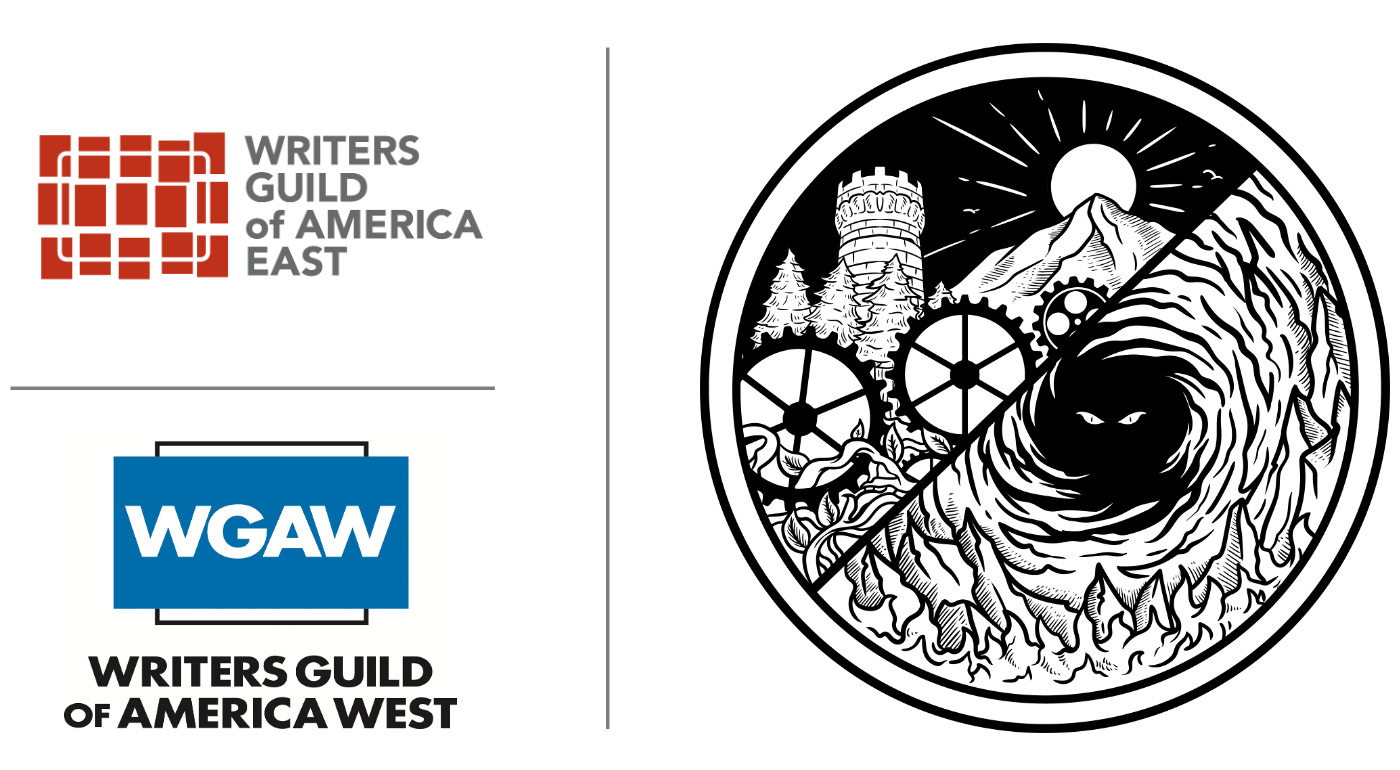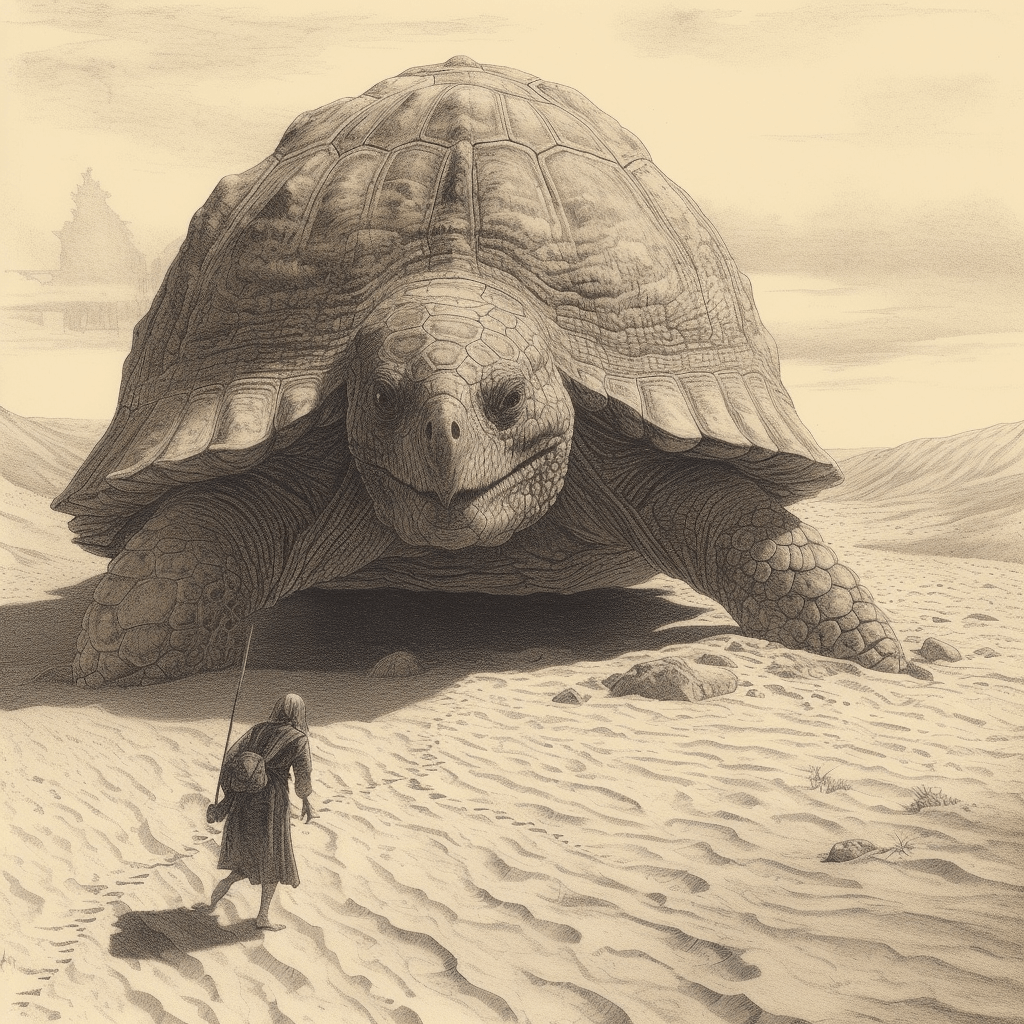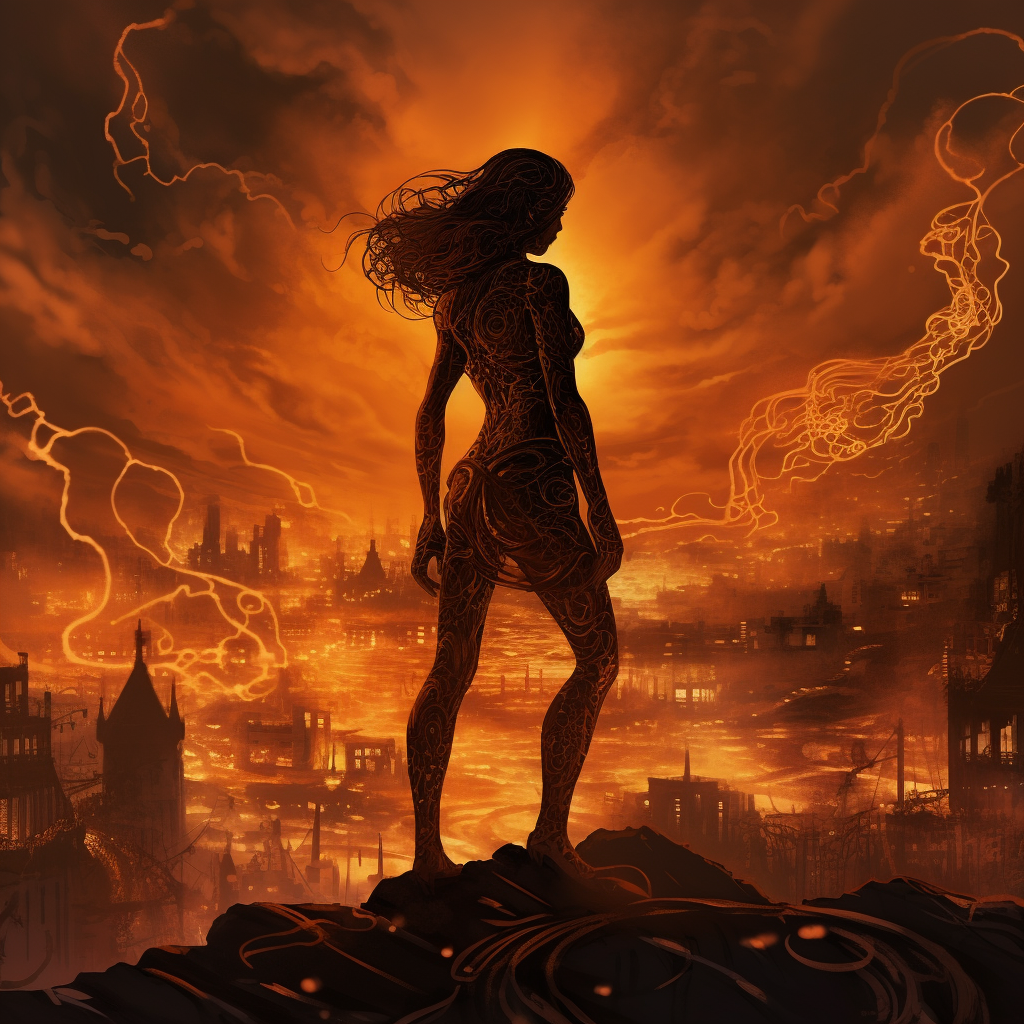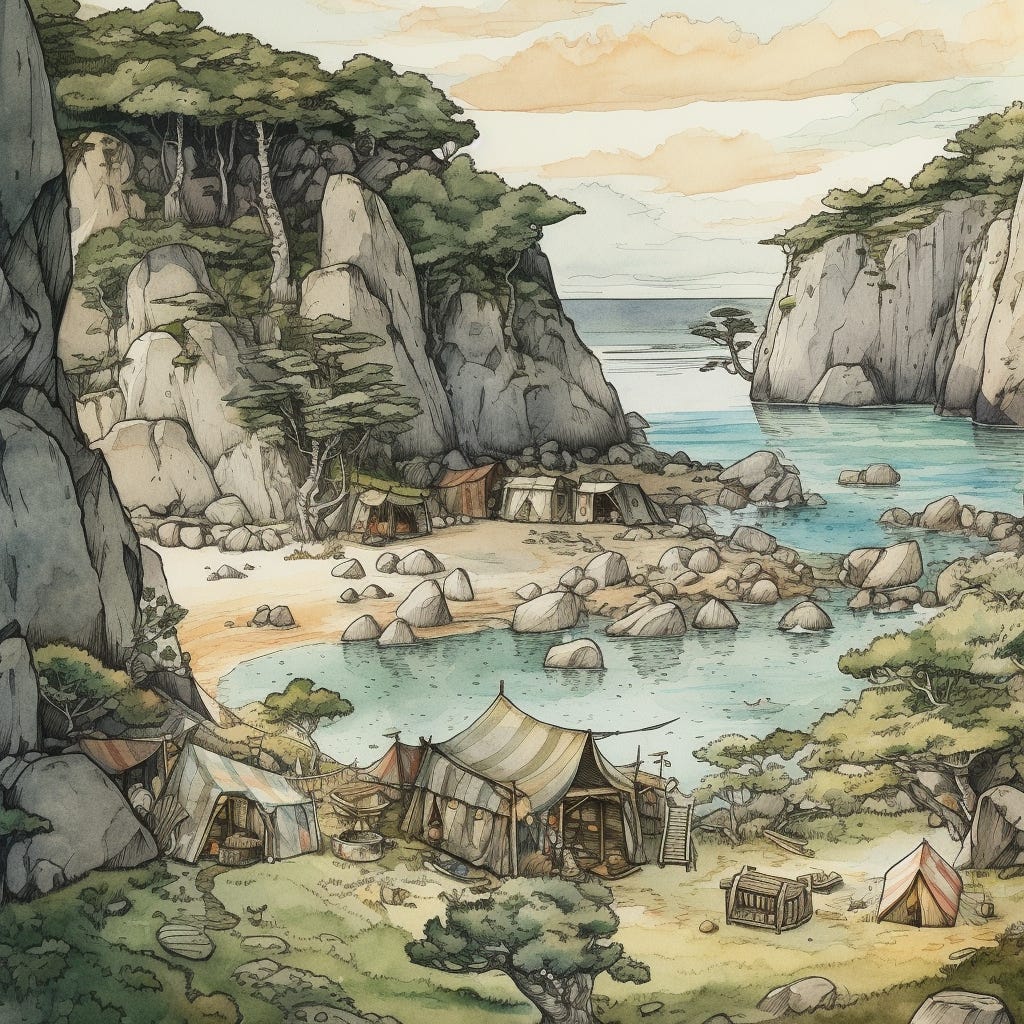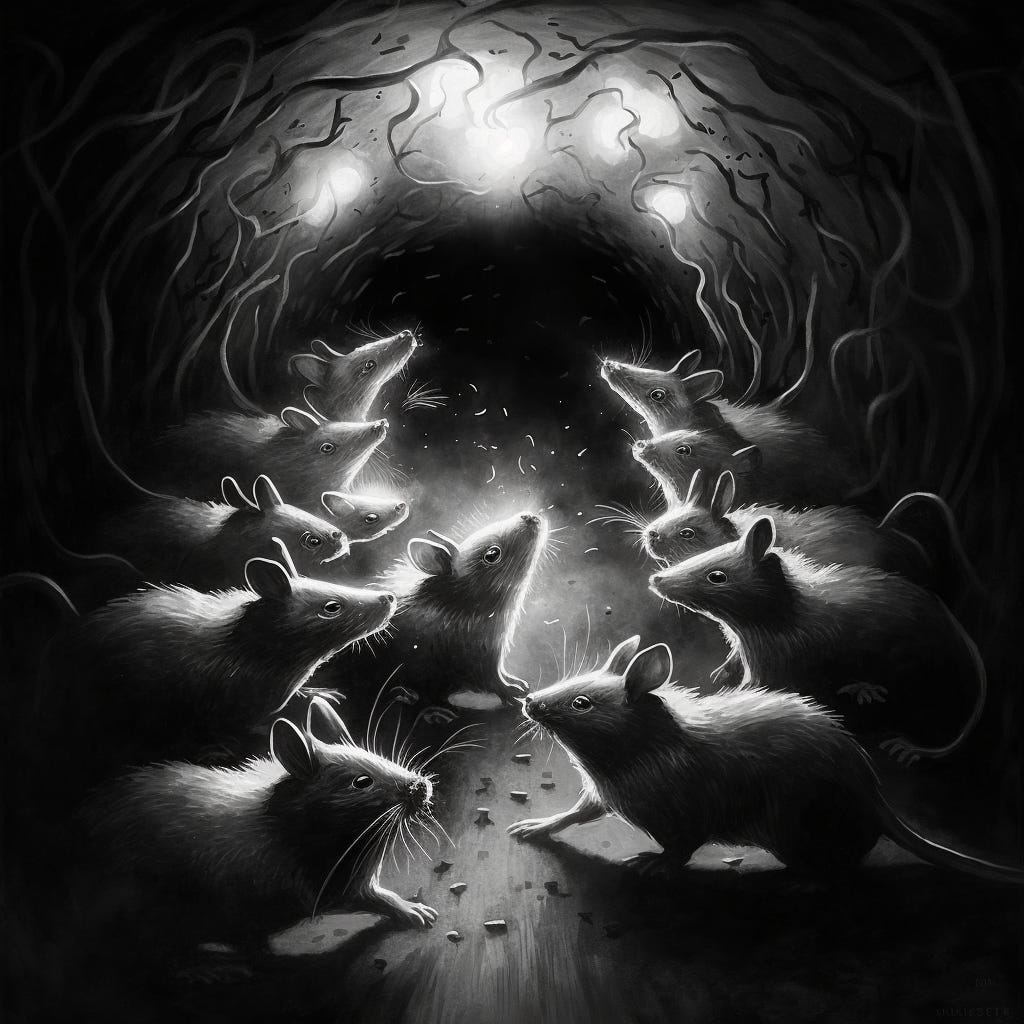Pigeons, Spice, and Murder Done Thrice
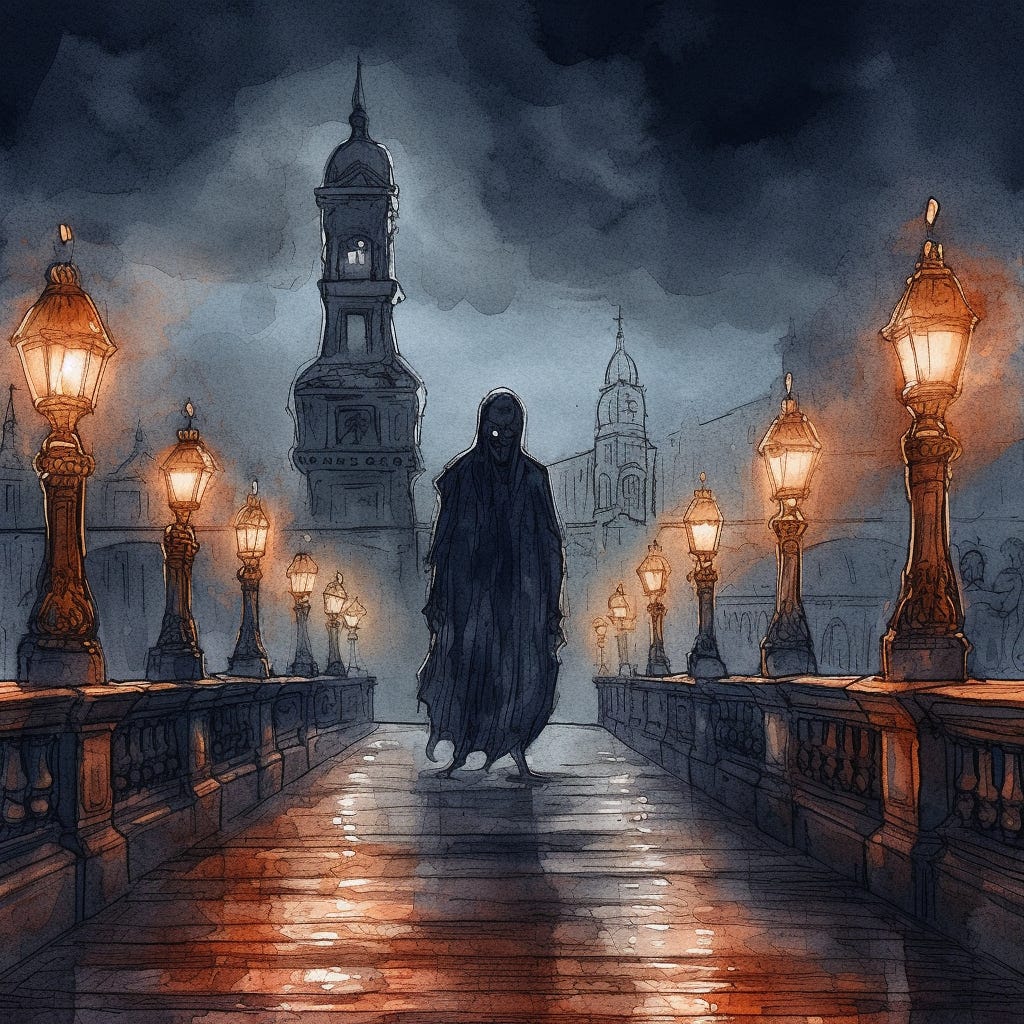
This ballad was shared at the 51st Conclave of Bards by Ned Trilling, Amalcross harbor historian.
The black water of the strait heaved far below, sucking and lapping around the algae-slicked pylons of the bridge. Byron Kove stared down at it. He gripped the cold iron railing tight, tighter still, until his knuckles turned white. Cold, misty rain mingled with the fog bank rolling in from the ocean. It wrapped Amalcross in a blanket of chill. He let his long leather riding coat hang open, whipping around him as the harsh wind pricked his skin. He grabbed the sheaf of papers from the inner pocket of his coat and flung them out, watching as they floated down to the water, far below, where they became water-logged and sunk beneath the surface.
He imagined it: The air, whipping past, cool and wet across his cheek. The refreshing pull of gravity as the Long Bridge receded above him. No choices to be made. No decisions. No more failures to wake up to in the morning. Nothing to lose when all was already lost.
Then, the water, cold, beyond cold, practically an ice flow, would smack into him, carve his legs out from under him as he crumpled into its embrace with a splash.
Undertow would pull him down. The foggy glow of the city and the bridge’s lamps would disappear above him, and all would go dark.
He took a deep breath.
“What are you doing?” A woman’s voice.
The bridge was deserted. The guards were hiding in the warmth of their shack at the far end. No one was about at three in the morning on an unseasonably cold night in spring.
“I said, what are you doing?”
He loosened his grip on the railing. Turned and scanned the bridge, eyes narrowed. Water dripped from the end of Byron’s thrice-broken nose. There was nobody there. Not a soul. He turned back to the business at hand, gripped the railing. Took a deep breath. In a minute, he wouldn’t have a care in the world.
“You have unfinished business.”
“What do you know about it?” He whipped around wildly, arms up, ready to fight. Still there was no one there.
“I’ve been watching you for years, and I don’t like having my time wasted.”
His eyes narrowed. He was very careful. No one — no one — could have surveilled him without him knowing it.
“By the gods above,” he said, “reveal yourself.”
The wind howled mournfully over the bridge. The rain hissed. He squinted through sopping bangs.
Then, there, right there, the faintest shadow, a shadow of a shadow, like a person beneath one of the tower lamps. He hadn’t noticed it at first; probably mistook it for the dark silhouette of one of the statues of Amalcross’s finest citizens that stood eternally watching the Long Bridge. Without thinking he placed his hand on his gun, felt its reassuring weight in his hand.
The shadow detached itself from its perch beneath the lamp. It moved, slick and oily through the rain and the mist. Closer. Closer. Why was he holding his gun? If this person — this shadow — was malevolent, wasn’t that what he was looking for anyway? Why defend yourself when it was time to end it all?
Nevertheless, he kept his hand on his gun, praying to steel-shrewd Quatha and all the gods above and below that the powder was still dry. He cursed himself silently for not taking care with his coat.
The shadow drew near, bringing with it a smell of rosemary, oranges, and bitter decay.
“You can’t kill yourself yet.”
“Why not?” His voice was hoarse, trapped in his throat. He could barely whisper.
“Because you just threw away the case notes to my murder, and I demand justice before your hurl yourself after them.”
⚙︎⚙︎⚙︎
The garret Byron called home was cold, damp, and just as rude, ill-furnished, and ugly as he had left it. A far cry from his former abode in Amalweave. No servants here, either. He hadn’t expected to return, and the coals in the stove had burned away hours before. His fingers stiffly struggled with the tinder box. A spark. Then, he pumped away uselessly with the hand bellows, long after the spark had dissipated. He labored away, refusing to look over his shoulder where the dark eminence loomed in the corner.
“Too bad you don’t have any paper,” it said.
Byron dropped the bellows angrily and whipped around. He opened his mouth to speak, then stopped. Perhaps this wasn’t real. He’d finally cracked, really cracked. He hadn’t simply lost the will to live, he’d also manifested his own spiritual tormenter into existence.
“There’s some oil in the lamp. Why don’t you splash a little of that on the coals?”
Yes, that was a good idea. De minimis, the apparition could be helpful. Byron poured a little of the oil from the fluted glass lamp onto the goals, struck another spark, and watched the flame dance. He placed the lamp back onto the table and lit it. Warm light, and the first inklings of heat, entered the garret. The floorboards were still full of splinters and the plaster was still pealing, but at least it would warm up a little. That smell — rosemary, oranges, dankness — was still in the air, but he found it didn’t bother him.
“You should probably eat something. It’s been two days.”
He grunted but acquiesced. If you’re going to imagine a tormenting spirit, don’t fight it on the small things. He went to the cupboard and scrounged a block of cheese with just a little mold on it and a hard roll. Good enough. Crossing to the window, he reached out onto the little ledge, where he’d tied a basket. The jug of ale was still there, the bottle cool and slick with damp. So much for spring.
He sat and ate, glaring all the while at the apparition. He swigged the beer. He ate and glared some more. It didn’t seem to care. Eventually, Byron started to get annoyed. It gnawed at him. How dare this hallucination disrupt his peaceful death, force him to warm up and eat, and then leave him to his own devices.
“Well. How do I make you go away?”
The apparition inclined its head — the part of its shadowy form where a head would be, at least — and spoke. “You can’t.”
“You’re in my godsdamned head, and it’s my head, so get out of it!” He jabbed a finger at the shade.
It sighed, long and low. “I’m not in your head. I’m here in the corner.”
He glanced at the label on the bottle of ale. Cogstone Brewery. Rilk’back Lager. Same as he always drank. He looked back at the spirit. “You’re real?”
“For fuck’s sake.”
“Are you… some Uncanny Being? A little godling?” His eyes lit up. “My mama used to tell stories about river demons that’d haunt you if you got too close. Always thought it was an old wives’ tale—”
“I am not a demon and not an Uncanny, at least not the way you mean. I’m Cecilia ‘ja Auric.”
“She’s dead.”
Cecilia shrugged her ghostly shoulders. “Exactly. That’s why I said my unfinished business is your unfinished business. You were hired to solve my murder and then you never did? Remember? Are you brain damaged from all the drinking?”
Byron stood and tossed a few more lumps of coal into the stove. “Even if you are a ghost—” He darted his eyes at Cecilia, who didn’t seem bothered by the word. “—your father stopped paying me over a year ago. Along with my other clients. I am — unfortunately — in a state of retirement.”
“You were once in quite high demand. You lived in a townhouse in Amalweave. A nice one. You discreetly solved so many of our city’s most-estimable citizens’ most-pressing problems.”
“I was also known to assist the police and those creeps at the Imperial Catechism,” Byron said. He felt a fleeting swell of long-forgotten pride in his chest.
“Before you let yourself go, that is,” the ghost that called itself Cecilia said.
Something caught in Byron’s throat. He swallowed, spoke thickly. “I couldn’t— there were no leads. You can only fail for so long before no one will hire you. When your father stopped paying me, word got around. I’d lost my edge.” He paused, chewed the inside of his lip. “At least this conversation conclusively ends the rumors that the corpse was a double and you had eloped with that sailor.”
Some flame kindled deep within Byron as this realization sunk in, and he stirred himself. He went to his desk and rooted around until he found a quill. Back at the window, he peered out to his left, leaned, and rapped on the window of the neighboring apartment.
“Bianca!” he called. Nothing. He banged louder. “Bianca! Paper!”
Still nothing.
He took a deep breath and bellowed, “BIANCA!” as the window slammed open.
“What? Godsdamn it, you wino. What? Shit yourself again?” She poked her head out under the eaves, holding her tawny hair back to keep it from the rainwater overflowing the gutter.
“Just give me some paper.”
“You woke me up for this?”
“You still owe me five drams.”
Byron held his hand out, waving it testily. Bianca wrinkled her nose and disappeared for a moment. She returned, shoving a wrinkled copy of the Amalcross Times into his hand.
“Thank you.”
She glared at him and then slammed her window once more. Byron shut his own window, then sat at the desk and began to scribble, jotting quick notes from memory.
“The body they found by the river was yours. I always knew it was, but your father never stopped hoping you’d turn up alive, and I used that to keep his money flowing. We’ll have to tell him at once that you are utterly, totally, conclusively dead.”
“You can’t do that.”
Byron’s head snapped up. “Why not?”
The specter whooshed towards him, enveloping him a shocking wave of cold, then alighted on the desk in a sort of dark, swirling pile. Cecilia extended a shadowy tendril towards the paper in his hand, pointing at a small item below the fold.
AMALCROSS SLASHER STRIKES AGAIN
BARON BASIL ‘JA AURIC SLAIN IN BED.
April 22, 449 Amal Era, Hightown
Baron Basil ‘ja Auric was found dismembered in his Highcross mansion late Tuesday night. While the Secretary of the Amalguard issued a simple statement confirming his death, ‘ja Auric’s housekeeper, one Sara Goring from Castle-Upon-Kine, indicated that the legendary spice merchant was found in his bedroom, and his remains arranged in the shape of an unknown glyph. Furthermore, Goring claims, his head was burned almost beyond recognition in the fireplace. Basil ‘ja Auric was the second member of the family to be killed in such a manner. A body that was presumed to be his eldest daughter, Cecilia ‘ja Auric, was recovered three years to the day near the confluence of the Boern River and the Amal Strait.
Magus Hellene Upsillion of the Magist Imperial University speculated that the purported binding glyph was not actually part of some spell, but rather a cunning distraction placed by the killer to draw attention to magical matters and away from a more parochial reason for the attack.
“This isn’t a real binding glyph,” Upsillion said. “It’s just a horrific, brutal mess intended to impugn the magical community in Amalcross.”
Basil ‘ja Auric is survived by his wife of thirty years, Sandrine ‘ja Auric, and his youngest daughter, Tabitha ‘ja Auric. Neither were available for comment, and the ‘ja Auric family indicated they were in seclusion in the family palace during a period of mourning. Imperial Catechism Chief Investigator Garvin… CON’T PAGE 3.
Byron read, mumbling to himself. How had he missed this? He’d worked Cecilia’s case for years. Basil had been a friend. Well, he’d been a deep-pocketed and highly motivated client. His most important client. When Basil had hired him, his inquiries shot up, and from a higher class of citizen. When he’d fired him… word travels quick among Amalcross’s elites.
Yet Byron still thought fondly of the time he’d spent in Basil’s drawing room, drinking his liquor and spinning yarns of his dogged pursuit of truth. They’d developed a rapport; Byron gave Basil hope, and Basil subsidized his life. Until he didn’t. But that wasn’t the old Baron’s fault. And now he was dead.
The story was three days old, and Byron hadn’t known his friend had died. He tried to remember three days before. He’d been drunk, he knew that. He’d emptied his wallet that night and drunk himself into a stupor at the thought of embarking on a new career as a beggar in the morning. He remembered slumping in a booth at the Deadman’s Arms, then being thrown out.
He rubbed his cheek, which throbbed at the memory of his landing on the cobblestones.
He read the article twice, then looked up at Cecilia when he finished.
“Don’t you know who killed you?” Byron asked. “Why wait three years to contact me? I could have saved your father from this.” He pounded the article on the table. The flash of anger felt good, like a moment of righteous respectability.
The specter reared up, swirling, into the vague silhouette of a woman once more. In that moment, Byron recognized her as Cecilia, just for an instance. The tilt of her head, the outline of her face. Then it dissolved into an angry swirl. Cecelia spoke, and now her voice was cold as ice.
“I did not see my attacker. There was just pain, and then death. I died. And in dying, I appeared at the Bone Gates. I turned my back on them and I wandered. I navigated the plains of death to return here. To my father. My mother. To our family’s legacy. To exact my revenge. I wandered for an endless time through the Meridian. I found I could watch you or my father, as if through a veil. Yet every time I tried to push through, it was as if some vicious creature struck me and pulled me back. Again and again.
“So, I watched, and I waited. I watched as my parents grieved, as my father turned ever inwards, never again leaving his home again. I watched as that mansion crumbled about him and our company floundered without one of us at its helm. And I watched as you strutted about, made claims to be on the brink of solving the case, strung him along and took his money. Dined at the best clubs on my father’s expense account in the name of research and investigation. And I watched as you struggled to solve my case, as first your clients and then the city turned against you, watched as you became dissolute, a drunken wreck of a man. I’ve had bargemen flogged for pettier mistakes than yours.
“But still I waited, testing the veil and hoping that once you had lost everything you would seek to regain your former glory, would attempt once more to bring me justice, to do right by my father. Until, one day, I felt those claws, those knives, leave my back. And in that moment, I pushed through, here, into this hovel you call a home. That was three days ago. The very moment — it seems — that my father died. You were passed out on the street and being beaten as recompense for an unpaid tab. I’d have joined in if I could have, but this ghostly coil has little material effect in the world of living.”
A memory floated to the surface of Byron’s mind: Had he been waylaid on his staggering path home? The bartender and his mates? A boot to his ribs. He still felt that. Then some shadow and them fleeing in fear. Had that happened? Had she saved him?
Byron took all this in. The lamp guttered as Cecilia shrank back down onto the desk. Finally, he spoke. “Tell me about your death. I’ll do what I can to make this right.”
The spirit gathered itself as the first rays of dawn broke upon the city and through Byron’s rain-streaked window. “Many of these details you already know, or you once knew, before you soaked yourself in drink and so carelessly discarded your years of meticulous notes into the Amal Strait.”
“What’s done can’t be undone.”
“Indeed. My father is — was — a man of great wealth, but he was not born into it. His name was not always ‘ja Auric. He came from nothing, grew up an orphan begging for bread on the corners of Pauper’s Notch. But he was industrious. Begging led to pickpocketing. With his earnings as a thief, he bought a coracle and begin harvesting flotsam and jetsam from the harbor. He was ten, and he became a fixture, always paddling about in the wakes of the big spice freighters as they returned from the Salavas Islands, laden high and riding low in the water with dyfwrych and saffronum and pepper.”
“What about your death?” Byron muttered as he changed his soaked and chafing clothes.
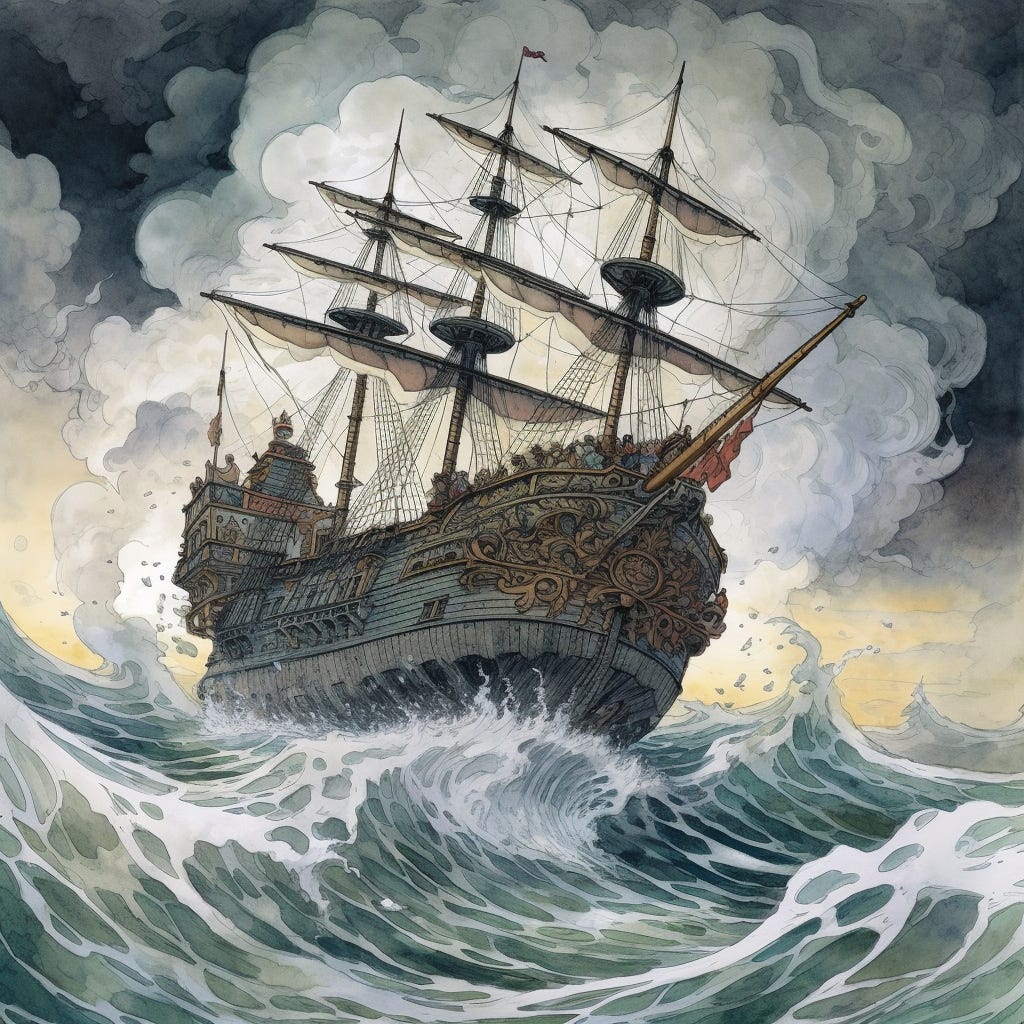
“Patience. The sailors admired his gumption, and soon enough he began smuggling small quantities of spice ashore under cover of night. And so he entered the spice trade. Each time a ship came in, he grew a little richer. Soon enough, he stopped piloting the coracle himself. He had a crew of orphans in their own little boats, all working for him. He devised the deals, supervised the sales, negotiated with the stall owners in the bazaar. By the time he was twenty, he had bought an apartment in a beam and stucco building — before they all burned — on a trendy block in Spicetown, not far from here, in fact. From his balcony he could see the great spice vessels rolling across the waves coming into port. He always chuckled that the ladies loved him then, in the years before he met my mother. He never spent coin when a favor could be turned to profit.
“Yet the fine guild merchants, relegated him to a life of striving, denied him admittance to a Guild and the legal rights of charter it provided. But my father was anything but a weak man. Imagine him, day in and day out, supervising his gang of orphans upon the waves, always a step ahead of the Imperial Customs house, paying a bribe here, fixing a deal there. He understood the spice trade better than the merchants themselves, because he was part of the underbelly. He saw what the rich and successful wanted to ignore.
“The bazaar had only been open a few decades at this point, and what spice made its way to the heartland and distant frontiers of the Empire, got there by happenstance. The war made supply chains fragile for anyone without an iron constitution. The merchants were concerned with the import of spice from the islands. Its distribution happened in the bazaar, where peddlers and hagglers took it — along with all of their other wares — to villages, hamlets, and far-flung cities. What spice that made its way to Lake Kine was invariably moldy and stale and sold for triple the price it fetched fresh in the bazaar.
“My father hired as many Boern River barges and armed guards as he could. He stamped his marque — the Beam House — upon the sachets and glass jars of spice. People from the Riverlands to the Sindar Mountains would go to market to buy a packet of Beam pepper. He made many enemies during this time.
“He’d drive the barge mules himself, up and down the river. He visited the towns around the lake, climbed the high mountains. Anywhere Beam House Spice was sold, my father knew the people. He built a second headquarters in Castle-Upon-Kine to serve the lake and mountain districts of the Empire. The guilds that had once scorned him soon invited him, courted him to throw in with them, to charter ships under their banners. Instead, he brokered a better deal. House Auric, that ancient bastion of the aristocracy, held sway at court, although certain branches of its family tree had begun to wither. The Emperor, my father reasoned, could ordain a new guild license. So, he provided an infusion of capital into the coffers of Auric, and the family provided him with a bride — my mother, Sandrine — and an introduction at court.
“The flowering of my father’s empire is well known. The ships of the Beam House Guild ply the oceans. Its barges rule the river. Castle-upon-Kine might as well be our own private city. He’d only been married to my mother a month when he left here in the capital. He spent three years in Castle-Upon-Kine, solidifying his monopoly in the region. He wasn’t present for my birth. Wealth and power did not make my father soft. I grew up at the center of a kingdom, but the weight he place upon my shoulders was so heavy. I was barely walking when he returned, but he dragged me with him to the docks daily.”
“Your mother allowed this?” Byron interjected.
“She was pregnant with my sister. Sara Goring, the servant he brought back from Lake Kine, carried me about. Apparently, I laughed for the first time when he broke the hand of a trader who had shorted him. He molded me to be like him, so trust me when I say that the list of those who hated him in those days, who could have killed him, is long and deep. At night, he’d sit by the fire, that great blazing hearth with the sigil of the Beam House hanging above it, with his ‘exploits’ painted upon the walls.”
“I know the room,” Byron said.
“He’d demand Lake Kine wine in that gravelly voice of his, and Sara would come scampering and fill his cup, always with our vintage. He’d never spent a copper if he could make something himself. And he’d drink and then test me, test my knowledge of the spice trade, of accounting, of the bends and shoals in the river, the conversions of weights and measures between the Riverlands, Lake District, and Sindar Mountains. The proper etiquette to address a Salavaster and the correct forms to file to appeal of a ruling at the customs house.”
Byron pulled on his hobnail boots. “I need to see the crime scene,” he growled.
He stomped down the rickety stairs, five floors, and out onto the cobblestone, shining with fresh rain and the rays of a hot spring sun.
Cecelia oozed her way into the upturned brim of his battered hat and continued to whisper frosty words into his ear as he tramped down the street. Around them, vendors hawked porridge and sausages. Byron bought himself a serving of both; still Cecilia spoke as he munched and muttered and stepped around rapidly curdling puddles.
“There was no praise when I got it right. But get an answer wrong, and he’d strike me. He once tore a book in half — a navigational tome — and boxed me about the ears with it when I failed to recall correctly the depth of the Bay of Savastown. By the time I was sixteen, I was more a hardened spicer than a princess. There was no tender childhood for me. My father would rather die and burn the Beam House Guild to the ground than see it in the hands of one of my effete cousins. Protect House Beam. That was the lesson, the only lesson, of my childhood. I’m telling you all this so that you understand that I will not give you one moment of rest until I have protected it. I came back from the grave to do this.”
“What about your sister? She’s still alive,” Byron said as he pressed through the horde of people on Long Bridge. He hissed at an old woman who looked askance at him as he spoke to himself.
“I was the eldest, and my father declared the Beam House Guild my responsibility. Tabitha’s only responsibility was to marry well, and my mother cloistered her away with my cousins. They rarely even visited the mansion. She grew up with dolls and cakes. I grew up with marlinspikes and grog.”
“She was engaged a few weeks ago, to Gregory ‘ja Auric.”
“A distant cousin. The ‘ja Aurics, like my father, keep the wealth in the family. I imagine the wedding will take place as soon as the mourning period is done. My father’d spew poison at the thought of Gregory taking control of the Beam House. Even when gout came for him and he could not attend directly to the warehouses and wharfs as he once had, he leaned on me to protect and strengthen the Beam House Guild. This brings me to my death.”
Byron leaped up onto the stairs of a passing trolly and held on as it trundled up the long hill from the Crossings to the high mansions of The Orbit, far above. “Took long enough,” he grumbled, drawing a dirty look from the mage piloting the trolly.
“I beg your pardon?” the mage snapped.
“Not you,” Byron growled, and the mage quickly looked away, leaning low over the brass levers, embossed with the binding glyphs of spells, that controlled and motivated the trolly.
“On the roof of our home, we have an enormous mews, where the pigeons roost.”
“Pigeons?”
“Carrier pigeons. They bring messages from Beam House agents and merchants across the empire. They’re faster than a rider and impervious to magical surveillance; even the most powerful binder can’t read a message written on paper and tucked into a pouch of a bird flying thousands of feet above the earth. Reading their minds is obviously pointless. They’re birds. My father long ago created the pigeon corps. It has always given us an edge over the competition.”
“Do I detect pride in your voice?”
“You do. He was a hard man, but he was smart. And I always loved the birds, even as a girl. It was the first place I’d go every morning with him, just as dawn broke. He’d read the messages from the birds as they arrived in the morning, bringing tidings of barge crashes, intel on competitor’s deals, the prices in markets near and far. I’d read them out to him as he shouted orders to his assistants. I continued the tradition even once he could no longer climb the stairs. It was how I too ran the Beam House Guild.
“On the morning of my death, I went to the roof as I always did. I was hungry. Sara hadn’t laid out breakfast yet. I remember this vividly, the hunger gnawing at me, the impatience. I felt like my father just then. As I was finishing the morning’s correspondence, a battered pigeon flew into the mews. It looks like it had gotten into a fight with a cat! Feathers all disheveled. And stranger still, I recognized it as one that only recently arrived.
Byron leapt from the trolly, landing hard on the stone sidewalk. He began to walk across the enormous, round plaza of The Orbit, towards a looming mansion on the far side. It was pink and covered in flourishes of stonework, which gave it the look of an iced wedding cake.
“This bird had only recently returned from Booley, and I hadn’t sent it back with a courier yet. It certainly shouldn’t have been out, much less carrying a message.”
“What message?” Gods, the walk across the plaza was long. Byron leaned for a moment against the granite base of one of the Orbit’s five obelisks, resting in the shade.
“It was simple. ‘Pay what you owe, or the sins of your father shall be revealed, and the Beam House will crumple and burn.’ It said to meet on a corner in Bloodtown at midnight.”
“Did you go?” Byron began the long trudge again.
“Yes. Someone had stollen the bird, written a message — knowing I would be the one to read it in the morning — and released it. Whoever it was, they were an insider, someone close, someone who knew my habits and the operations of our guild and our family. The list was small. I stupidly assumed it was a prank being played by my feckless sister, a foolish trick intended to bring us together. And if someone really was blackmailing us, I was ready to gut them like a fish.
“I went to the meeting alone that night, without guards. I carried a knife. I’d used it before. I wasn’t worried. The home was empty when I left, apart from my father who had drunk himself asleep. My mother and sister were away, no doubt at some ball I wasn’t invited to, or — again I thought it — laying it wait to surprise me.
“The trolly had stopped running, so I took a horse, and I tied it to a post outside the Ale & Marrow. I walked the rest of the way, no more than twenty minutes, into Bloodtown. I had grown up on the wharf and on barges and around my father’s sailors and traders. I fit right in. No one noticed me. No one bothered me. It was very dark. I arrived at the corner. It was just outside of one of our warehouses.”
“Your body wasn’t found outside a warehouse. Which one was it?” Byron growled. At last, the far side of the plaza. He climbed the stair to the door and grasped the brass knocker. He slammed it on the plate three times: BANG, BANG, BANG.
“Just a warehouse. Holding for shipments bound for the Lake District. Nothing remarkable. I heard movement behind me. I turned, but— I couldn’t see who it was. I drew my knife. They struck me in the head with something, and I crumpled to the ground. Everything was dark for a while.”
“It was a pestle,” Byron said. “A big one, for grinding spices for a shop or a large kitchen.” BANG, BANG, BANG! He slammed the knocker three more times. “Your mother still has servants, doesn’t she?”
“Only Sara. It was only ever Sara. My father objected to the expense. She cooked, she cleaned, she did everything. When I was young she did it with joy. Then, she just did it. Anything he asked, as if he held something over her. A pestle you say?”
Cecilia drooped momentarily over the brim of the hat, and Byron had the distinct impression the shade was looking at him. “Yes,” he grunted, trying the doorknob. Locked up tight. “The Amalguard found it a few days after you died. It had the Beam House marque on the base of the handle, and a clump of blood and hair. Your theory about an insider adds up. We’ll try around the back.”
“I woke… later. It was light out, just light. I was lying on the riverbank. I was bound. I lay like that for a long time, until the sun was high. In the cattails. I was gagged. I heard the barges passing by, but I could not shout.”
“That’s where they found you,” Byron said, sizing up the walls protecting the house’s garden.
“There was someone there. With my knife.”
“Man or a woman?”
“I don’t know. The last thing I saw was a flash of light. The blade as it rose above me.”
Byron glanced over his shoulder, checking for bystanders, then heaved himself up and over the garden wall. He landed in a topiary on the other side. Brushing leaves from himself, he surveyed the damage. “Was this supposed to be a horse?”
“A donkey. Like the ones that pull our barges.”
He nodded. “You didn’t see the killer after you died? You know, as a ghost like you are now? When you were behind the veil?”
“I told you, I went next to the Bone Gates.”
Byron surveyed the garden. It had once been magnificent, but the fountains were dry, and the decorative shrubs and topiaries were overgrown with vines. He walked to the middle and stood beside a reflecting pool pocked with dead leaves and algae. He squinted up at the house. The windows were dark, the curtains drawn.
“My mother is probably at the ‘ja Auric palace. Sara should be here. Perhaps Tabitha. She had an idiot’s love of my father, because he doted on her and she hardly knew him,” Ceclia hissed.
Byron walked the length of the garden, then stepped up onto a veranda and approached the glass doors to a conservatory. He leaned in and peered through the windows. Darkness shrouded the interior.
He moved slowly, trying each of the conservatory doors, muttering as he went. “They found you late that afternoon. Trash pickers, gathering rubbish cast off into the river. Your body was, um, disassembled. Your organs arranged about you in a circle, your limbs crossed. Sure looked like a binding glyph, though not one the scholars could identify. And there was no evidence of a spell having been cast. Your head was nearby, in a pile of ashes, where it had been burned. Again, no evidence of a spell having been cast. Like the spell was incomplete.”
He picked up a loose brick and with a snap of his wrist smashed a pane of glass. He reached through and unlocked the door from the inside. It creaked open on rusty hinges. “Your home has seen better days.”
“My father was always cheapskate. If my mother hosted a dinner, he’d track what the guests drank and send a bill. When he became obsessed with finding me, he let everything fall by the wayside. You were the one person he spent freely on. After I died, he drove everyone from his life, including my mother. For months, you and Sara were the only ones he talked to. Clearly, the house was too much for her to keep up with, and she’s old now, almost as old as my father was.”
“A loyal servant,” Byron said, walking carefully through the sepulchral house. The air was leaden, still, and thick with the smell of blood. Silence enveloped them, and even Byron’s footsteps on the marble floors seemed stifled. He moved carefully, room to room, through the conservatory, the foyer, the gallery, the dining room. There were no signs of struggle, nor of forced entry. Everything, in fact, looked as he remembered it from his audiences years before when Baron Basil ‘ja Auric had first hired him to investigate Cecilia’s death. How many times had that old, stooped servant ushered him into this very sitting room for the Baron to ply him with firewine and whiskey and interrogate him about the investigation. Each time, Byron had spun a tale and left with a fat wallet to continue his investigation. Now, shame welled up within him at the thought.
He gazed about the room. They were the same florid baseboards and moldings, the same frescos depicting the spice trade: The vessels upon the sea, the merchants haggling with the Salavasters, the river barges, the mules, the Amalcross mansion — this very house — with a flock of pigeons taking flight from the roof and Basil himself, with his wife and daughters standing before it. Byron walked along the frescoed wall absentmindedly. At the far end, the enormous trading house at Castle-Upon-Kine was depicted, looming above the lake, and once again, Baron Basil ‘ja Auric stood before it, accompanied by a woman with jet black hair.
Byron paused, looked at it curiously. “I must have seen this fresco dozens of times, but I never noticed her before.” He looked back the way he had come, at the depiction of the Amalcross mansion. The same woman stood there, slightly apart from the family. “Who is this woman?”
“Sara Goring, when she was younger. She came into my father’s employ on his first visit to Lake Kine.”
“I hardly recognize her. She was here, those times I met with your father, but her hair—”
“White as driven snow. I know. It happened when I was very young. She argued with my father. She needed money. I listened at the door of the office as she pleaded. Through the keyhole, I saw her on her knees. She said he’d ‘promised to do right by him.’”
“Him?” Byron interjected sharply.
“Some family member who was sick. He wouldn’t give her more money. Said he already paid her. So, she departed for several weeks, the only time I remember her taking a leave, and when she returned, her hair had gone white,” Cecilia said. “It’s the only time I remember them fighting. Otherwise, she was as unerringly loyal and she was ill-tempered. She never left his side.” In the cloister of the house, she no longer whispered, and her voice seemed to clatter through the empty rooms.
Together, they continued through the house, up the stairs to the second floor, Cecilia oozing along beside him, guiding him.
“His chambers,” she said, stopping before a pair of ornate doors.
Byron pushed, and they opened easily, without a sound. These, at least, were well-maintained. The room, like all the others, was shrouded in darkness. The smell of blood was overwhelming. A dark stain marked the center of the floor where the body had lain. Pencil shavings and chalk marks marred the floor.
“The Imperial Catechism has been here and taken the body,” Byron said as he watched Cecilia glide to the dry blood where the corpse of her father had lain.
Careful not to disturb the chalk marks or the site of the murder, Byron crossed the room and pulled back the curtains. Harsh light flooded the room, making it seem squalid and cheap. A murder ends the same in a mansion or a flophouse. Byron leapt onto the bed and stood, arms crossed, gazing down at the spot where the body had lain.
“What are you doing?”
“Getting a better look. See, the blood, and the chalk marks.”
The specter loomed at him.
“Of course you do. Well, from up here, they look like the glyph that was formed by your body. The orientation to the head is reversed, if we assume that your father’s head was, uh, placed in the hearth as the article said. So, the same as your dismemberment, but different. For some reason.”
He leapt from the bed, his boots crashing to the floor under his weight.
Swiftly, they searched the rest of the house. Room after room, richly appointed yet covered in dust. A reliquary to wealth without life. “I need to talk to your mother. Or your sister. They’re the last links,” Byron said, tramping down the stairs. Cecelia, gliding along beside him, said nothing.
Yet, as Byron yanked open the front door and light flooded in, she froze, and as he watched, she jerked, and it was as if an invisible blade sliced through her shadowy form. An otherworldly shriek, a scream of anguish from beyond the veil sprung forth from the specter, and she writhed.
The sound reverberated through the house. A flock of pigeons, their wings flapping in panic and abandon, swooped down from the roof and alighted in the center of the plaza. And then all was silent. Cecilia loomed once more.
“What happened?” Byron asked, swallowing.
“The creature, whatever beast held me prisoner. It, it struck me. Just now it tried to take me back beyond—”
She screamed again.
Byron ran to her, tried to grab her, his hands passing ineffectually through her in his attempt to give comfort. And as her scream died, he heard another, faint, every so faint, but unmistakably the scream of a living breathing human-being. It was muffled but came from below.
“Is there a basement?” he shouted at Cecilia.
The shade gestured with a long tendril towards her father’s office. “Spice smugglers tunnel. There’s a door, hidden—”
The invisible blades returned, she writhed, her words cut short, and Byron ran at a sprint to the office.
⚙︎⚙︎⚙︎
Everything about the office said that its occupant was an important man. The desk was enormous. The walls paneled in mahogany. Built-in shelves overflowed with books and marble busts of mythological heroes, Uncanny creatures, and, in their very center, Baron Basil ‘ja Auric himself. Yet there was no door. As Cecilia’s screams reverberated, Byron tore the room apart, rifling through the desk looking for a hidden switch, a key, anything. Turning to the bookshelves, he threw books away feeling about in desperation for a hidden panel. Nothing.
He stood back, surveyed the shelves. Of course.
The shelves rumbled back when he yanked on the bust of the baron himself. The heavy bookcase swung aside, revealing a set of spiral stairs dropping down. The scream, the human scream, echoed up them.
⚙︎⚙︎⚙︎
Byron ran, breakneck, down the stairs, two at a time, his coat flapping about him. Though it was dark, a faint light flickered far below. Shadowy knives seemed to creep up the walls and ceiling, as if propelled by their own volition. The screams grew louder and louder, as did a faint sound of lapping water as he went deeper underground. He slowed as he reached the bottom. The acrid smell of smoke reached his nostrils. A fire burned within. Rounding the final corner, he arrived in a marble chamber.
On the far side of the chamber, a small rowboat bobbed in swift channel which flowed away into the dark in either direction. In the center of the chamber, a fire flickered. Beside it lay a young woman, bound, a trickle of blood running from her wrist.
Over the girl stooped Sara Goring, clutching a long, wicked dagger in her hand, white hair gleaming in the light of the flames. Around her, a pattern of blood had been dripped upon the floor.
“The first drops have been spilled,” Goring hissed at Byron. “It has begun, and you are too late to stop it.”
He advanced into the room slowly. The air seemed to hum about him, but with a resonance too high to be identified by human senses. “Let her go,” he growled.
“I will not. It has already begun, and the spell must be completed.”
It was only then that Byron became aware of another eminence in the room, a shadow darker than shadow in the corner. It was small, but with each drop of blood that fell from the point of the knife, it seemed to grow, long knives of shadow elongating from it.
“Baron ‘ja Auric,” Byron addressed it, boldly, though in truth he did not feel an ounce of courage.
The old woman cackled. “The Baron. Ha! Honey drips upon his tongue at the Bone Gates already. His essence was given up. No. This is not the Baron.”
Slowly, carefully, Byron inched his hand beneath his coat, feeling for the reassuring weight of his gun.
Noticing the twitch of his coat, the woman knelt quickly, and held the blade to the young woman’s throat. “Keep your hands where I can see them. Toss the gun in the water.”
Byron gingerly removed the gun and did as he was told. It plopped into the channel with a splash.
“Just kill her, kill her—” the young woman hissed, before the point of the blade pricked her throat.
“Stop your whining, brat,” the woman hissed. “You lived a spoiled life while your tyrant father— no matter. Now your sacrifice will give new life to another.”
“Why are you doing this?” Byron growled. “Why? You helped raise them.”
“I want my son back,” her bloodshot eyes went wide as she spat the words at Byron. “The heart and the head thrice given of shared blood, shall restore the dead to this world. He was no more than a bastard to the man you called a Baron, but to me he was everything! Everything! I slaved for that fucker, and he allowed my boy to die so he could save a few coppers.”
Sara drew another pick of blood upon the blade, then flicked it to another spot on the ground about them. The shadow in the corner grew ever so slightly.
With a slash, Sara drew the blade quickly down Tabitha’s arm, sending a torrent of blood onto the floor, then brought the knife back around, raising it for a killing blow.
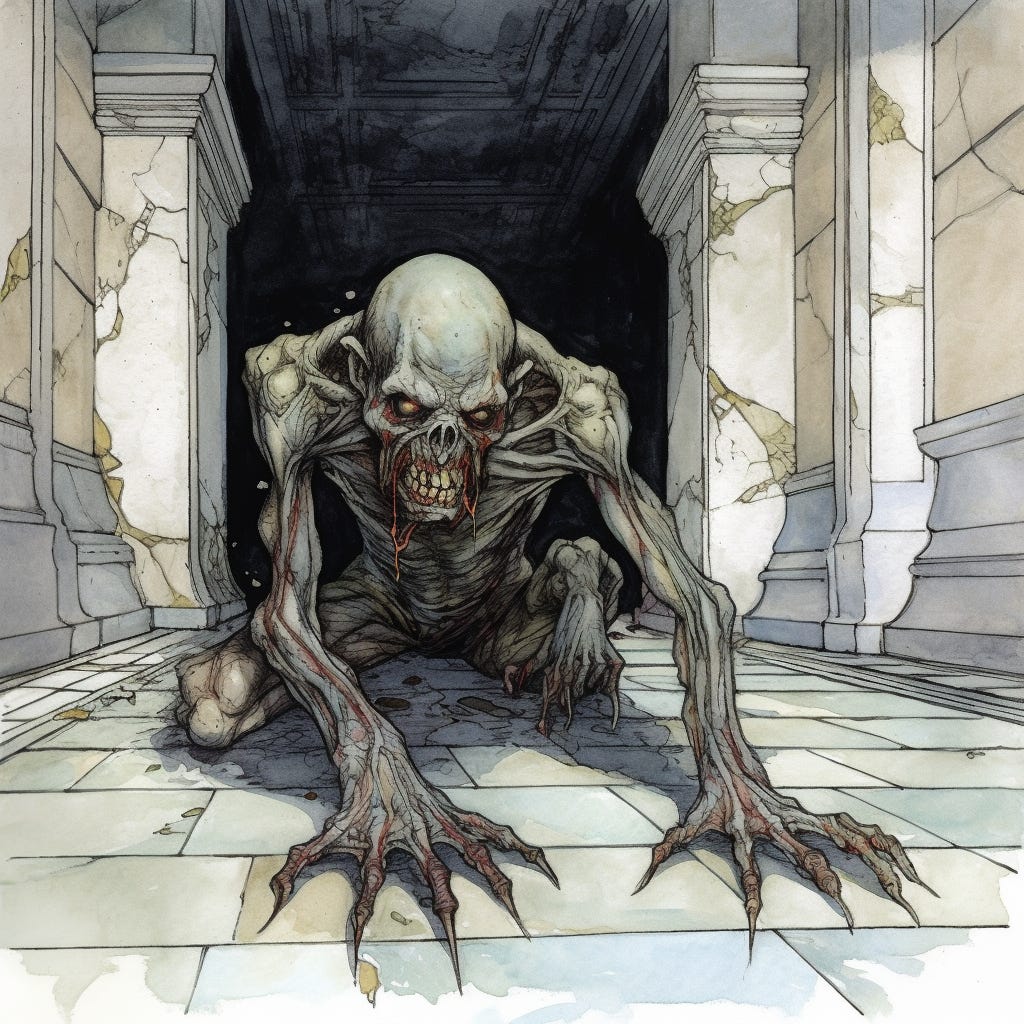
Byron launched himself forward, grappling the old woman, grabbing at her wrist.
Then, a slow, squelching noise emanated from the corner. Slowly, slowly, Byron and Sara turned to looked. A lurching, ashen, figure, the form of a boy, yet in a profound state of decay, staggered towards them.
Step by agonizing step, it came at them. Rotting flesh sloughed off it only for a new scab to grow in its place. The bloody glyph on the floor bubbled and hissed. A rancid smell wafted over them, and Byron felt the bile rising in his mouth. The creature’s bloodshot eyes rolled about in its head, and it let out a long, low, ghastly howl.
“Mother,” the creature — the corpse boy — howled amidst the gnashing of teeth and the ghastly slopping of liquifying flesh.
“No. No. No!” Sara cried out. “It cannot be. The heart and the head thrice given of the same blood. His two sisters. His father. What is this? My boy, my boy, my darling beautiful boy, I’ll make it stop. I’ll bring you back. You’ll hurt no more.”
And she dropped the knife and shuffled forward on her knees, arms raised as if to embrace the shambling boy in a hug. She shuffled forwards on her knees, beckoning to it.
“My son, my son. It is you. Come, come, feast upon her.”
It shambled closer and closer. Held out its arms. Entered her embrace. She quivered and wept a mother’s tears as she drew the corpse boy close.
For a brief instant, Byron saw a flicker of recognition, of emotion, in its cold, dead eyes. Then its decaying jaws levered open. It bit down, hard, tearing at its mother’s jugular. Blood sprayed and spattered, and the old woman, convulsed, tried to push it off. It tore at her again and again, then began to feast, pulling at her entrails with its bony fingers and decaying teeth.
Something jabbed Byron in the ribs, jolting him from his shock.
“The knife,” Tabitha cried, “get the knife!”
Tabitha’s elbow dug into him again, and he sprung into action. He grabbed the knife and began to saw at her bonds. The fibers of the rope holding her wrists began to part as the slavering behind him stopped.
The slow, dragging, footfalls squelched on the floor behind Byron. An overpowering odor of death wafted toward them. He sawed with the blade. “Your mother, where is your mother?” he growled.
“With my grandfather. She hates it here—”
Tabitha’s eyes went wide just as the rope binding her hands severed. Byron felt a bony, impossibly strong hand closing upon his shoulder.
He turned, arm up to strike with the knife, but the creature, caught it, deflecting the blow and sending the blade clattering away. It bore down on him, jaws dripping gore.
“Return to the Bone Gates and the cold embrace of death!” Cecilia’s voice rang out.
A dark shape struck the creature with the force of a cannon ball, sending it reeling back. Its rotting flesh exploded into a bolus of pure darkness, then black razors shot out from it, grappling with Cecilia’s twilight whirlwind.
Cecilia enveloped it, and the two writhed and thrashed. They pulsed, a maelstrom of shadow. Black energy welled up around them, filling the room.
“Save yourselves!” Cecilia screamed, and Byron grabbed Tabitha’s hand.
As they dove into the water of the channel, the last thing Byron saw was a torment of black energy, the electric crackle of pure chaos, filling the room above them.
⚙︎⚙︎⚙︎
The water ran fast and cold, tumbling them down the twisting, dark channel, deep beneath the stones of the city. Somewhere in the tumult and torrent, Byron struck his head. He struggled to keep his head above water. It rushed into his mouth. He was choking on it. Then someone embraced him, bore his head to the surface, and he gasped air again. They floated and tumbled this way for some time, and Byron lost all sense of self, of order, up or down, in the darkness.
⚙︎⚙︎⚙︎
The cry of a seagull. Red lights strobed. His eyelids fluttered. He flexed his hands in the sand. He lay on a pebble-strewn beach. He opened his eyes, groaning. A silhouette loomed above him. The shape — Cecilia? He retched, heaving brackish water.
When he turned back, Cecilia had gone. Tabitha sat beside him, her wrist bound with the torn hem of her dress.
“What happened to your sister?”
Tabitha blinked. “My sister?”
He sat in silence.
“You struck your head when we escaped. I’m not— I’m Tabitha. You’re Byron Kove, right? That investigator my dad hired after — well, after Cecilia died.” She smiled weakly at him. Out at sea, a merchant vessel, heavily laden, tacked in the wind, the pennant of the Beam House Guild snapping at the peak of its mizzenmast. “Thank you for saving me.”
“Thank your sister,” he growled. “All I did was live.”



